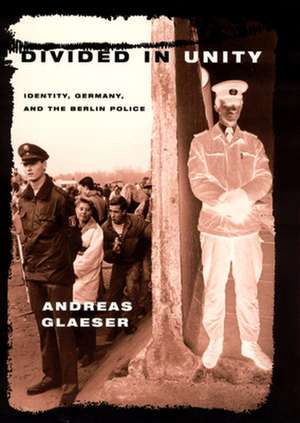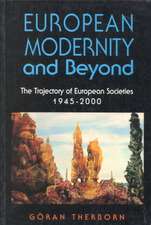Divided in Unity: Identity, Germany, and the Berlin Police
Autor Andreas Glaeseren Limba Engleză Paperback – 13 ian 2003
More than a decade after unification, Germany remains deeply divided. Following East and West German police officers on their patrols through the newly-united city of Berlin and observing how they make sense of one another in a fast-changing environment, Andreas Glaeser explains how East-West boundaries have been maintained by the interactions of institutions, practices, and cultural forms-including diverging patterns of understanding rooted in vastly different social systems, readily revived Cold War images, the continuing search for an adequate response to Germany's Nazi past, and the politics and organization of unification, which impose highly asymmetrical burdens on east and west. Glaeser also leverages his ethnography to develop an innovative approach to studying identity formation processes. Central to his theory is an emphasis on the exchange of identifications and the particular ways in which they are deployed and recognized in interpretations, narratives, and performances as parts of face-to-face encounters, political discourses, and organizational practices.
Preț: 322.93 lei
Nou
Puncte Express: 484
Preț estimativ în valută:
61.80€ • 64.28$ • 51.02£
61.80€ • 64.28$ • 51.02£
Carte tipărită la comandă
Livrare economică 14-28 aprilie
Preluare comenzi: 021 569.72.76
Specificații
ISBN-13: 9780226297842
ISBN-10: 0226297845
Pagini: 400
Dimensiuni: 152 x 229 x 25 mm
Greutate: 0.53 kg
Ediția:1
Editura: University of Chicago Press
Colecția University of Chicago Press
ISBN-10: 0226297845
Pagini: 400
Dimensiuni: 152 x 229 x 25 mm
Greutate: 0.53 kg
Ediția:1
Editura: University of Chicago Press
Colecția University of Chicago Press
Notă biografică
Andreas Glaeser is an associate professor of sociology at the University of Chicago.
Cuprins
Preface
Acknowledgments
Introduction
1. Viewing Each Other through Space
2. The Political Organization of Identification
3. Times Ajar
4. Performing Work
5. Challenging Sincerity
6. Individual Rights and the Morality of States
7. Building, Shifting, and Transgressing the Public-Private Divide
Conclusion
List of Acronyms or Abbreviations
References
Index
Acknowledgments
Introduction
1. Viewing Each Other through Space
2. The Political Organization of Identification
3. Times Ajar
4. Performing Work
5. Challenging Sincerity
6. Individual Rights and the Morality of States
7. Building, Shifting, and Transgressing the Public-Private Divide
Conclusion
List of Acronyms or Abbreviations
References
Index













